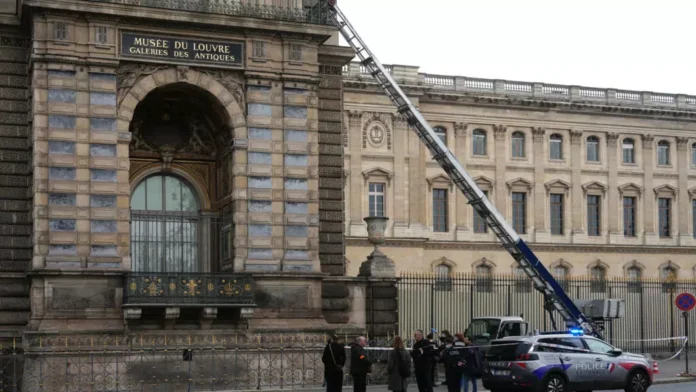Paris was jolted on Sunday by a stunning daylight robbery at the Louvre Museum, where four masked men executed a meticulously planned theft of “priceless” imperial jewels the first such incident at the world-renowned institution in over two decades.
According to French police, the heist bore the hallmarks of organized crime. It unfolded between 9:30 and 9:40 a.m., when the culprits used a truck equipped with a mechanical lift to reach a first-floor window overlooking the Seine. Armed with portable cutting tools, they smashed the window, entered the celebrated Apollo Gallery home to the French crown jewels and shattered two reinforced display cases containing the historic pieces.
Security sources said the thieves were equipped with small power saws, and an abandoned electric scooter believed to have been used in their escape was later found nearby. The Louvre declined immediate comment on the incident, though the museum later announced on X (formerly Twitter) that it would remain closed for the rest of the day “due to exceptional circumstances.”
Operation Lasted Just Seven Minutes
Interior Minister Laurent Nuñez told reporters that the robbery lasted only seven minutes, describing the perpetrators as “highly professional and possibly foreign.” Police investigators from the Paris judicial brigade’s anti-crime unit and the Central Office for the Fight against Trafficking in Cultural Property have been assigned to the case, with over sixty officers involved in the probe.
The stolen jewels — eight pieces from the 19th century belonging to the French royal and imperial families — include a ruby necklace once worn by Queen Marie-Amélie, wife of King Louis-Philippe I, featuring eight rubies and more than 600 diamonds. Another stolen item was an emerald necklace from Empress Marie-Louise, Napoleon Bonaparte’s third wife, studded with 32 emeralds and over a thousand diamonds.
During the heist, the robbers inadvertently dropped a ninth piece — the diadem of Empress Eugénie, wife of Napoleon III — as they fled the scene. It was later recovered at the site. France’s public prosecutor, Laure Beccuau, confirmed that the four men escaped on motorbikes and remain at large.
The Motive and the Mystery
Given the near impossibility of selling the jewels intact due to their global recognizability, investigators suspect two scenarios — either the thieves acted on behalf of a private collector, or they intended to dismantle the jewels and sell the gemstones separately as part of a money-laundering operation.
The Ministry of Culture said prompt intervention by the Louvre’s staff forced the perpetrators to flee, leaving behind some of their tools. Still, officials admitted that the level of sophistication and speed of the operation had exposed serious vulnerabilities in France’s museum security systems.
Renewed Concerns Over Museum Security
The heist, the first at the Louvre since 1998, has reignited a heated national debate about the safety of cultural institutions, which have increasingly become targets for well-coordinated criminal groups. Nuñez acknowledged that “museum security remains fragile” and cited a new protection plan launched by the Ministry of Culture earlier this year one that notably includes the Louvre.
France has faced a string of similar incidents in recent months. In September, gold samples worth an estimated €600,000 were stolen from the National Museum of Natural History in Paris. Around the same time, the porcelain museum in Limoges one of Europe’s most prestigious — was robbed of items valued at €6.5 million.
Political Uproar
The Louvre heist sparked outrage across political lines in a country already grappling with social and political tensions. Far-right National Rally leader Jordan Bardella called the robbery “an unbearable humiliation,” adding, “How long will the decline of the state continue?” Laurent Wauquiez, head of the conservative Republican group in the National Assembly, declared, “France has been looted. We must protect what is most precious to us and our history.”
Nuñez reaffirmed that French authorities are intensifying efforts to capture the culprits, describing them as “experienced professionals” and “likely foreign nationals.”
A Stolen Past and a Shaken Future
The Louvre, which welcomed nearly nine million visitors in 2024 — 80 percent of them foreign tourists — remains the most visited museum in the world. Home to 35,000 artworks across 73,000 square meters, it stands as a global symbol of art and history — and now, a scene of high-profile criminal audacity.
President Emmanuel Macron, who pledged in January to expand and renovate the Louvre following concerns about its deteriorating infrastructure, vowed that the museum “will be restored and modernized to ensure its security and legacy.”
As the world watches the unfolding investigation, the heist has come to symbolize more than just a theft of jewels — it is a theft of confidence, an assault on French heritage, and a stark reminder of how fragile even the greatest treasures can be in the face of modern criminal ingenuity.


